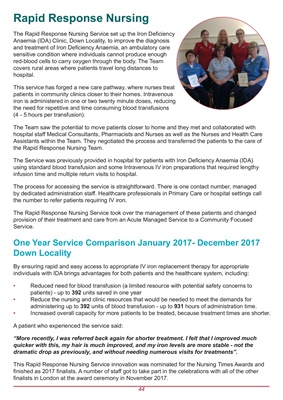
The Rapid Response Nursing Service set up the Iron Deficiency
Anaemia (IDA) Clinic, Down Locality, to improve the diagnosis
and treatment of Iron Deficiency Anaemia, an ambulatory care
sensitive condition where individuals cannot produce enough
red-blood cells to carry oxygen through the body. The Team
covers rural areas where patients travel long distances to
hospital.
This service has forged a new care pathway, where nurses treat
patients in community clinics closer to their homes. Intravenous
iron is administered in one or two twenty minute doses, reducing
the need for repetitive and time consuming blood transfusions
(4 - 5 hours per transfusion).
The Team saw the potential to move patients closer to home and they met and collaborated with
hospital staff Medical Consultants, Pharmacists and Nurses as well as the Nurses and Health Care
Assistants within the Team. They negotiated the process and transferred the patients to the care of
the Rapid Response Nursing Team.
The Service was previously provided in hospital for patients with Iron Deficiency Anaemia (IDA)
using standard blood transfusion and some Intravenous IV iron preparations that required lengthy
infusion time and multiple return visits to hospital.
The process for accessing the service is straightforward. There is one contact number, managed
by dedicated administration staff. Healthcare professionals in Primary Care or hospital settings call
the number to refer patients requiring IV iron.
The Rapid Response Nursing Service took over the management of these patients and changed
provision of their treatment and care from an Acute Managed Service to a Community Focused
Service.
One Year Service Comparison January 2017- December 2017
Down Locality
By ensuring rapid and easy access to appropriate IV iron replacement therapy for appropriate
individuals with IDA brings advantages for both patients and the healthcare system, including:
• Reduced need for blood transfusion (a limited resource with potential safety concerns to
patients) - up to 392 units saved in one year
• Reduce the nursing and clinic resources that would be needed to meet the demands for
administering up to 392 units of blood transfusion - up to 931 hours of administration time.
• Increased overall capacity for more patients to be treated, because treatment times are shorter.
A patient who experienced the service said:
"More recently, I was referred back again for shorter treatment. I felt that I improved much
quicker with this, my hair is much improved, and my iron levels are more stable - not the
dramatic drop as previously, and without needing numerous visits for treatments".
This Rapid Response Nursing Service innovation was nominated for the Nursing Times Awards and
finished as 2017 finalists. A number of staff got to take part in the celebrations with all of the other
finalists in London at the award ceremony in November 2017.
Rapid Response Nursing
44